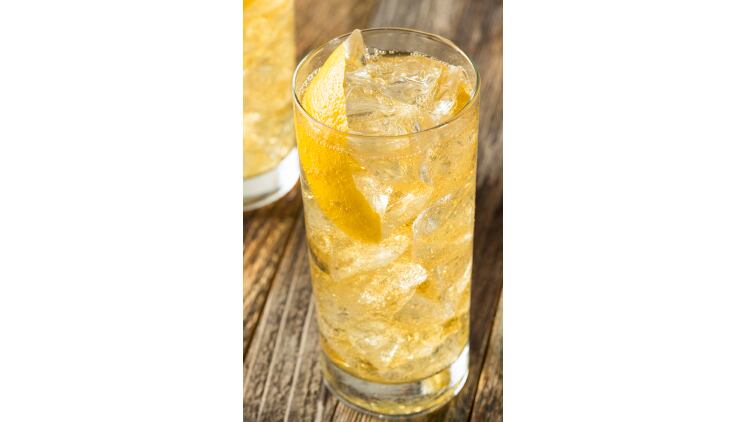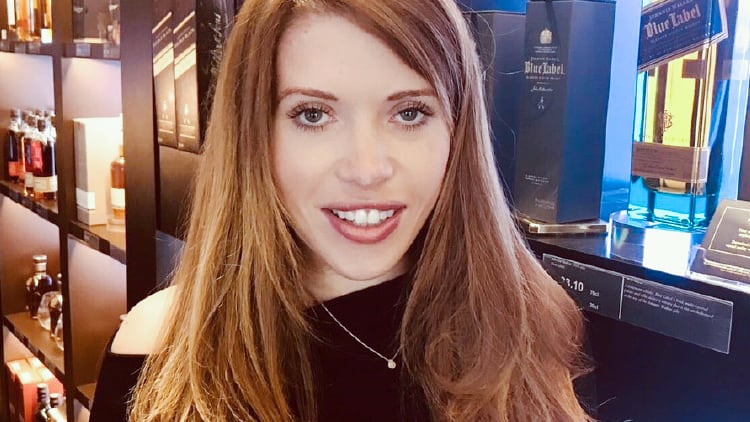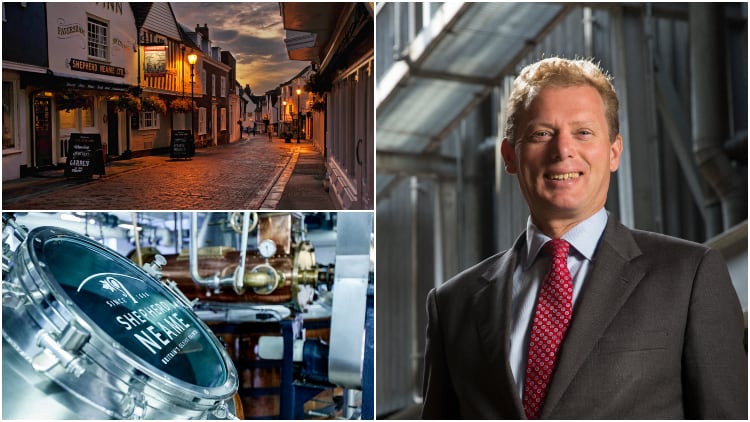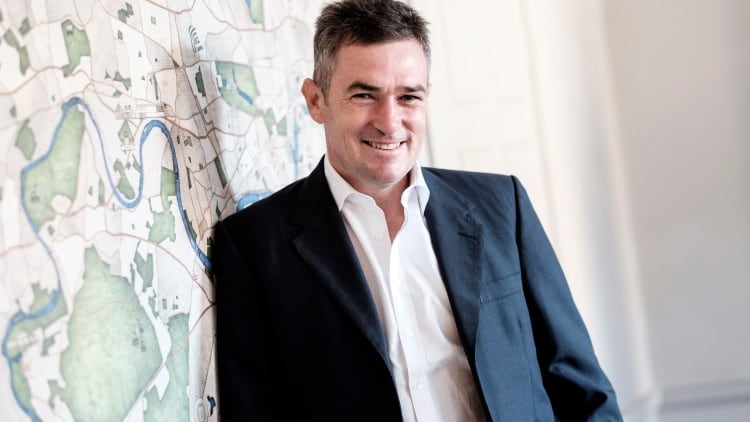There’s little wonder why Diageo pursued Melissa Yorke over several years; she is incredibly intelligent, quick-witted and decisive. At no point during our short interview does she need to take a long pause to consider the answer to a question.
It may be a given that someone in a senior post at a company as vast as Diageo should know their stuff but Yorke only took the position of on-trade director in January this year, having previously worked at pharmaceutical giant Johnson & Johnson. Although, like many in the sector, a career in the alcohol industry wasn’t part of Yorke’s original plan.
She studied law at Cambridge, but decided that reaching the legal kind of bar was not for her and instead switched her focus to a job in fast-moving consumer goods (FMCG).
“I did law and had a logical moment about what I enjoyed about my law degree, which was negotiation, evaluation, problem solving and taking in data or using analytics to fix a problem, which is how I came up with FMCG,” explains Yorke, who was born in Canada but moved to Yorkshire at the age of two.
“It’s also because you think to yourself: ‘I’ve spent three years getting this damn degree, I might as well go and do a graduate scheme and use it’. So that’s the angle I was coming from.
“That’s how I fell into the alcohol category, and I did fall into it, but purposefully started an FMCG career.”
Training as a buyer
Her grounding in FMCG started at Asda’s head office in Leeds, where she did a graduate training programme as a buyer. It was always her intention to move back into buying after discovering what it was like “on the other side of the fence” as a supplier, but it doesn’t look like that will happen. Yorke’s path to Diageo followed her desire to gain insight into the inner workings of blue chip companies, hence the move to Johnson & Johnson.
As well as believing she would return to buying, Yorke also intended to stay at the pharmaceutical company for longer than the year she was there. But the pull of Diageo, and the opportunity that was laid before her, proved too much to turn down.
“I’ve had about five conversations with Diageo over the years, but it’s never really been the right time with the right role, so it’s always been a bit of a standing joke that we’ve had a conversation and nothing has been able to happen with it.
“But we had a conversation, Charles Ireland (Diageo general manager for the UK, Ireland and France) and I, in September last year. Initially I had no agenda to leave where I was at all, but he ambushed me with his HR director and was really charming and I decided to join the company in January – and it’s been really good,” Yorke chimes, rightly proud of how her career has progressed.
What’s refreshing about this interview is how realistic Yorke’s views on industry and world issues are. Her solutions to the problems many are facing are practical and can apply to not only the blue chip company she works for, but also pubcos and single-site freehouses.
One area in particular is Yorke’s view on diversity, particularly as one of the questions she is frequently asked is “you’re the only female in this kind of role” or “you’re so different to other people in the trade, what do you think about that?”.
Ensuring diversity
My favourite pub
I love the Nag’s Head in Brentwood, Essex, because it’s got an open fire and does some great food, but it’s also where I have the best Sundays with my best friends. For me, if you’ve got great food and great service along with decent drinks, roaring open fire and you’re there with your mates, there’s nothing better. I would pick that over something wacky.
As a result, she is eager to play her part in ensuring diversity in a white male-dominated industry – not just within companies such as Diageo, but within the wider pub and drink industry. “We’ve been talking to the BBPA (British Beer & Pub Association) about how we can really support diversity in the trade and have a line of recruitment into the sector to make sure it’s an environment everyone can thrive in, irrespective of their background and beliefs.”
She is deadly serious about this. Too often Yorke has been one of, at the most, two senior women in high-level meetings, she says. But she is also wary of positive discrimination, and realistic about how and why women can take a fairer share of jobs in the industry.
Yet, it’s not just about the male:female mix in the workplace, although clearly important for Yorke. Diversity is a much broader term for the director – going beyond sex, gender and race.
She is passionate about getting people from all walks of life into work, through the Government’s Movement to Work scheme and Diageo’s Learning for Life programme, both of which up-skill members of society who may not have had the best start in life.
“We’ve started to have conversations around this with operators,” she explains. “Learning for Life gives us the ability to take applicants who are in a certain bracket and give them some skills and training they can use and thrive in the hospitality sector.
“So we take them and give them core skills and then we fit some of those candidates in to the market, which is totally agnostic of a commercial agenda, but it really helps the sector to survive.
“The rates in which they can succeed, because they’ve been through that training, are much higher than if you would take a bet on a neat candidate, which businesses openly admit that they don’t because the drop-out rate
can be high.”
Positive discrimination
Rightly or wrongly, diversity has been given more attention in recent years because of the conversation and noise around the topic, Yorke says, adding that “it just feels appropriate now and maybe it was taboo in the past, but people feel more comfortable talking about it now”.
But, back to positive discrimination, Yorke has a self-proclaimed “positive discrimination phobia” and says she finds it a hard topic to talk about. She believes Diageo is good at championing equality, saying the only time she notices she’s the minority is at external meetings.
“If I went to a conference and looked around the room and then sat in a meeting in Diageo and look around the room, there are two different make-ups of groups.”
Sage recruitment advice
But, when it comes to recruitment, Yorke has some sage advice that can and should be adopted by every business. Instead of looking to fill a vacancy with a specific type of person, in a bid to close the gender or race gap, which can often lead to positive discrimination, Yorke and Diageo will only begin the interview process once there is a diverse mix of candidates with the right experience.
“You don’t start recruiting until you have a diverse range of candidates,” explains Yorke. “You can’t go and have an interview if your three candidates are all identical, with everyone an extrovert or an introvert, and all white or all male.
“Also, that really comes from the perspective of respecting your consumer base, because if you go out into the on-trade, you wouldn’t see a group of people who all look the same. You can’t reflect what consumers want if you’re not a diverse team yourself.
“It’s also about ethnicity, sexual orientation, and thinking styles. If I look at my leadership team, I’m not 50:50 male:female in my direct reports – I’ve still got more males than females
but, actually, they all have different thinking styles.”
Back to business, and Diageo has just undergone a major change with its on-trade team, which was led by Yorke. Leading the changes to Diageo’s on-trade team was one part of the role that attracted Yorke to the position.
Previously, there were three separate teams on the ground in the on-trade, comprising a quality ambassador team, a beer sales team and a spirits sales team. However, following a trial, the structure has been changed and there’s now one quality serve team operating in one area.
‘Activation specialist’
Within that team there is a new role of ‘activation specialist’ who goes into pubs and bars without a sales agenda and helps operators increase their beer and spirits performance. “And we’ll say things like, ‘do you know how to do a push on social media?’ and we’ll pay for that if it’s pushing one of our brands and put some funding into the outlet to show them how to use social media to drive traffic, so it’s almost a free trial to help with that.
“We’ve made big investments in overheads and we’ve made big investments in below-the-line activation, which isn’t a switch from above the line, it’s incremental investment into the GB market,” explains Yorke.
“And it’s doing really well. The positive for us was we managed to make all of those changes with no people impact. There’s been three restructures going on in the trade at once, which is quite a lot, but it’s really nice that we’ve been able to do it with incremental headcount and it’s a really nice story for the on-trade to say how we’re investing in it.”
As a result of the changes, Yorke believes the independent free-trade has had a shot in the arm, resulting in bigger strides in turnover for pubs, bars and Diageo.
Visible impact on sales
Favourite drink
Currently, Johnnie Walker and ginger, which is like red wine and olives in my head – they’re grown-up foods. When I joined Diageo,

I didn’t like Scotch so I started with Haig Clubman and Coke, and found an affinity for it. But, you have to put orange in the top of your whisky and ginger ale and ginger beer.
The move was made within 12 months, one of the fastest changes within the business, says Yorke, and has had a visible positive impact on Diageo’s sales performance. In July, Diageo reported an annual sales increase of 8% in Britain, driven by core beer and gin brands.
Beer sales under the Guinness brand also rose by 8%, driven by “a strong performance of Guinness Draught and Hop House 13 Lager”. Gin brand Tanqueray doubled net sales and gained 30 basis points in market share in
the fastest-growing alcohol category in western Europe, the company’s preliminary results for the year ending 30 June 2018 showed.
Sales of Diageo’s Scotch brands, which include Johnnie Walker, were up 6% on the previous year. Premium ‘Reserve’ brands, specifically those in the whisky category, delivered double-digit growth. However, mainstream vodka brand Smirnoff saw sales decline by 2%.
Things are moving in the right direction for Diageo, but one of the things that keeps Yorke awake at night, which could slow down progress, is alcohol tax. “We’ve got one of the most highly taxed regimes of any developed market and we need to make sure we can continue to have a competitive market for the industry,” she says.
The Wine & Spirits Trade Association recently called on Chancellor Philip Hammond to stop his proposal to increase taxes on wine and spirits by 3.4%, in line with inflation. It claims the Government has raked in record sums from wine and spirits taxes, indicating another rise is unnecessary.
However, one of the many positives Yorke draws from the sector is the rapid innovation it has created – especially within the past year or so. The number of new launches, focusing on flavour, is doing wonders for the sector and is likely to be an area of increased focus.
With Yorke at the helm of Diageo’s on-trade activities, there’s no doubt there will be more to discuss in the near future. Even after a few months, the on-trade director has made big waves.



